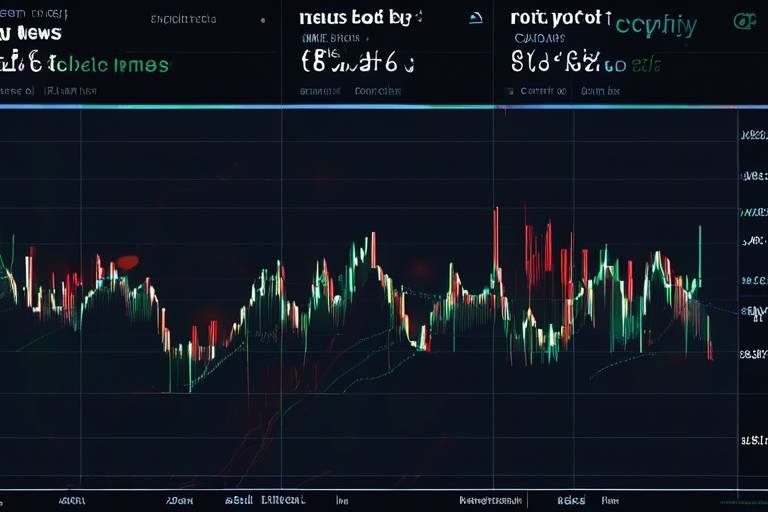The Role of Institutional Investors in Shaping Crypto Markets
The world of cryptocurrency is a dynamic and ever-evolving landscape, and at the forefront of this transformation are institutional investors. These financial powerhouses, comprising pension funds, hedge funds, and asset management firms, are not just dabbling in digital currencies; they are fundamentally reshaping the market. But how exactly do these entities wield such influence? In this article, we’ll dive deep into the multifaceted role of institutional investors in the crypto markets, exploring their impact on market stability, investment strategies, and the regulatory environment.
To truly grasp the influence of institutional investors, it's essential to understand who they are. These are organizations that manage large pools of capital on behalf of others. Think of them as the giants of the financial world, wielding significant clout in the markets they enter. Their investment goals often differ from those of individual retail investors, focusing more on long-term growth and risk-adjusted returns. This distinction is crucial because it shapes their approach to investing in cryptocurrencies, which can be notoriously volatile.
One of the most significant effects of institutional investors entering the crypto market is the potential for increased market stability. With their substantial capital, they can provide much-needed liquidity, which is vital for maintaining a healthy trading environment. Imagine a bustling marketplace where buyers and sellers can easily find each other—this is what liquidity does for crypto markets. By reducing volatility and smoothing out price swings, institutional investors help create a more sustainable ecosystem for cryptocurrencies.
Liquidity provision by institutional investors is akin to adding more lanes to a busy highway; it allows for smoother traffic flow and reduces the chances of congestion. When these investors buy and sell large amounts of cryptocurrency, they help ensure that there are enough buyers and sellers in the market, which makes transactions easier for everyone involved. This increased liquidity not only benefits institutional players but also retail investors, who can trade with less fear of significant price fluctuations.
Unlike many retail investors who may chase quick profits through speculative trading, institutional investors typically adopt a long-term perspective. They focus on fundamental analysis, assessing the underlying value and potential of cryptocurrencies. This approach can lead to more stable investment patterns, as these investors are less likely to react impulsively to short-term market movements. By prioritizing long-term growth, they contribute to a more mature and resilient market.
In the world of finance, risk management is essential, and institutional investors are experts in this area. They employ sophisticated techniques to navigate the unpredictable waters of the crypto market. This might include diversifying their portfolios across various digital assets or using advanced financial instruments to hedge against potential losses. Such strategies not only protect their investments but also bolster overall market resilience, making it less susceptible to dramatic downturns.
The presence of institutional investors significantly influences market trends and sentiment. Their investment decisions can act as a barometer for the overall health of the crypto market. For instance, when a prominent hedge fund announces a substantial investment in Bitcoin, it can instill confidence in retail investors, prompting them to enter the market as well. Conversely, if these investors pull back, it can create a wave of caution among smaller players. This interplay between institutional and retail investors is crucial for understanding market dynamics.
As institutional investors increasingly engage with the crypto space, their influence extends beyond market dynamics to regulatory frameworks. These investors often advocate for clearer regulations that protect their interests while promoting innovation. Their participation can lead to heightened scrutiny and the establishment of guidelines that govern digital asset trading, which is essential for fostering a secure environment for all market participants.
Institutional investors are vocal proponents of regulatory clarity. They understand that a well-defined regulatory landscape not only safeguards their investments but also encourages more players to enter the market. By pushing for regulations that balance protection with innovation, they help create a more stable and trustworthy market environment. This advocacy is crucial, as it can lead to policies that benefit both institutional and retail investors alike.
When institutional investors enter the crypto market, they bring with them a wealth of experience from traditional finance. This includes compliance standards and best practices that can enhance the credibility of the cryptocurrency industry. By adhering to rigorous compliance measures, these investors help legitimize the market, making it more appealing to a broader range of participants.
The future of cryptocurrency markets will likely be significantly influenced by the continued involvement of institutional investors. As they refine their strategies and share insights, they will play a crucial role in the maturation of the market. This influence will not only affect adoption rates but also drive technological advancements within the blockchain space. With institutional investors leading the charge, the crypto market is poised for a transformative journey ahead.
- What are institutional investors? Institutional investors are organizations that invest large sums of money on behalf of others, such as pension funds, hedge funds, and insurance companies.
- How do institutional investors impact cryptocurrency markets? They provide liquidity, stability, and long-term investment strategies, which can reduce volatility and enhance market maturity.
- Why is market stability important? A stable market attracts more investors, fosters growth, and reduces the risks associated with price swings.
- What role do regulations play in the crypto market? Regulations help protect investors, ensure fair trading practices, and enhance the legitimacy of the cryptocurrency industry.

Understanding Institutional Investors
Institutional investors are the heavyweights of the financial world, encompassing entities such as pension funds, hedge funds, and insurance companies. These organizations manage vast sums of money, often in the billions, and their investment decisions can significantly influence market dynamics. Unlike retail investors who may dabble in various assets with smaller amounts, institutional investors have a more strategic approach, focusing on long-term growth and stability. Their unique characteristics, such as access to advanced research and analytics, allow them to navigate complex markets effectively, making them pivotal players in the cryptocurrency space.
One key aspect that sets institutional investors apart is their investment goals. They typically aim for substantial returns over an extended period, which contrasts sharply with the often short-term, speculative nature of retail trading. This focus on long-term gains drives them to conduct thorough fundamental analysis, evaluating the underlying value of cryptocurrencies and their potential for future growth. As a result, their presence in the market can lead to more informed trading and investment decisions, creating a ripple effect that influences other market participants, including retail investors who may follow their lead.
Furthermore, institutional investors often have access to superior technology and resources, enabling them to implement sophisticated trading strategies. They utilize advanced algorithms and quantitative models to optimize their investments, allowing them to capitalize on market inefficiencies. This technological edge not only enhances their profitability but also contributes to overall market efficiency. For instance, when institutional investors enter the crypto market, they often bring with them a level of credibility and legitimacy that can attract additional investment from both individuals and other institutions.
In summary, institutional investors are a formidable force in the cryptocurrency markets. Their investment strategies, characterized by a focus on long-term stability and informed decision-making, play a crucial role in shaping market behavior. By understanding the motivations and actions of these entities, we can gain valuable insights into the evolving landscape of digital assets. As they continue to engage with the crypto space, their impact will likely grow, leading to new opportunities and challenges for all market participants.

Impact on Market Stability
The involvement of institutional investors in the cryptocurrency markets brings a level of sophistication and stability that is often lacking in more volatile environments. These investors, which include pension funds, hedge funds, and other large financial entities, have the ability to inject significant capital into the market. This influx of funds not only enhances liquidity but also plays a pivotal role in reducing price volatility. Imagine a seesaw; when institutional investors step in, they help balance the weight on both sides, making the ride smoother for everyone involved.
One of the most critical aspects of their impact is through liquidity provision. When institutional investors enter the market, they bring with them substantial amounts of capital that can be traded. This increased liquidity allows for more efficient transactions, meaning that buying or selling assets can occur without causing drastic price shifts. For instance, a large retail investor might find it challenging to sell a significant amount of cryptocurrency without impacting the price negatively. In contrast, institutional investors can execute large trades with minimal market disruption, fostering a healthier trading environment for all participants.
Moreover, institutional investors generally adopt long-term investment strategies. Their focus is often on fundamental analysis and the potential for growth over time, rather than the short-term speculative trading that many retail investors engage in. This long-term perspective can help stabilize the market as it encourages a more measured approach to investing. Think of it as planting a tree; while retail investors may be looking for quick fruits, institutional investors are nurturing their saplings, ensuring that they grow strong and sustainable over the years.
Additionally, these investors utilize advanced risk management techniques to navigate the inherent volatility of the crypto landscape. They employ strategies such as diversification, hedging, and rigorous analysis to protect their investments. This not only safeguards their portfolios but also contributes to the overall resilience of the market. By managing risks effectively, institutional investors can weather market downturns better than most, further stabilizing the ecosystem. It's akin to having a safety net; when the market experiences turbulence, their strategies can catch the fall, preventing a complete collapse.
In summary, the impact of institutional investors on market stability is profound. By providing liquidity, adopting long-term strategies, and implementing robust risk management techniques, they create a more sustainable environment for cryptocurrencies. This stability not only attracts further investment but also fosters growth, paving the way for a more mature and resilient crypto market.
- How do institutional investors affect cryptocurrency prices?
Institutional investors can stabilize prices by providing liquidity and reducing volatility, which helps prevent drastic price swings. - What strategies do institutional investors use in crypto?
They typically focus on long-term investment strategies, employing thorough market analysis and risk management techniques. - Why is liquidity important in cryptocurrency markets?
Liquidity allows for smoother transactions and helps mitigate price fluctuations, making the market more attractive to investors.

Liquidity Provision
When it comes to the world of cryptocurrency, liquidity is the lifeblood that keeps the market pumping. Think of it as the oil in a well-tuned machine; without it, everything grinds to a halt. Institutional investors play a pivotal role in providing this liquidity, which is essential for ensuring that trades can happen smoothly and efficiently. They bring in substantial capital, allowing for larger transactions without causing significant price fluctuations. This is particularly important in a market that can be notoriously volatile, where prices can swing wildly based on news or market sentiment.
By stepping into the crypto space, institutional investors help to create a more robust trading environment. Their presence means that there are more buyers and sellers available at any given time, which reduces the chances of experiencing sharp price drops or spikes. This increased liquidity not only benefits institutional players but also retail investors who may be looking to buy or sell their assets. With a more stable market, retail investors can trade with greater confidence, knowing that they are less likely to be caught off guard by sudden price changes.
Moreover, institutional investors often utilize advanced trading strategies that further enhance liquidity. For instance, they might employ algorithmic trading techniques that can execute trades at lightning speed, ensuring that orders are filled quickly and efficiently. This not only helps in maintaining price stability but also encourages other market participants to engage more actively in trading activities. The result? A healthier ecosystem where cryptocurrencies can thrive.
To illustrate the impact of liquidity provision by institutional investors, consider the following table that compares the liquidity levels in markets with and without institutional involvement:
| Market Type | Liquidity Level | Price Volatility |
|---|---|---|
| Institutional-Driven Market | High | Low |
| Retail-Only Market | Low | High |
This table clearly shows that markets driven by institutional investors tend to have higher liquidity and lower price volatility. As they continue to enter the crypto space, the overall trading landscape is expected to improve significantly. In essence, institutional investors are not just participating in the market; they are actively shaping it for the better.

Long-Term Investment Strategies
When it comes to investing in cryptocurrencies, institutional investors often take a different approach than retail investors. While many retail investors might be tempted by the allure of quick profits through speculative trading, institutional investors typically focus on . This method is rooted in a deep understanding of market fundamentals and potential growth trajectories. But what does this really mean for the crypto market?
Institutional investors tend to analyze cryptocurrencies not just as mere digital assets but as part of a broader investment portfolio. They look for projects with solid fundamentals, strong use cases, and the potential for long-term adoption. This involves meticulous research and analysis, akin to how one might evaluate a company’s stock. They ask questions like: Is the technology robust? Does the team have a proven track record? What is the market demand for this cryptocurrency? By answering these questions, institutional investors can make informed decisions that align with their long-term goals.
One of the key aspects of their long-term strategy is diversification. Just like a well-balanced investment portfolio in traditional finance, institutional investors often spread their investments across various cryptocurrencies. This strategy helps mitigate risk and enhances the potential for returns. For example, an institutional investor might allocate funds across established coins like Bitcoin and Ethereum while also investing in promising altcoins that could have significant upside potential.
Another important element is the commitment to holding assets for extended periods. Unlike retail investors who might sell at the first sign of a price dip, institutional investors are generally more patient. They understand that the crypto market can be volatile in the short term but believe in the long-term potential of their investments. This patience can lead to more stable prices and less panic selling, contributing to overall market stability.
To illustrate this point, consider the following table that compares the investment strategies of institutional and retail investors in the cryptocurrency market:
| Aspect | Institutional Investors | Retail Investors |
|---|---|---|
| Investment Horizon | Long-term | Short-term |
| Research Approach | Fundamental analysis | Technical analysis |
| Risk Management | Sophisticated techniques | Varied approaches |
| Market Influence | Stabilizing | Volatile |
By adopting these long-term investment strategies, institutional investors not only aim to achieve substantial returns but also contribute to the maturation of the cryptocurrency market. Their presence encourages a more sustainable trading environment, ultimately benefiting all participants in the ecosystem.
In conclusion, the long-term investment strategies employed by institutional investors are crucial in shaping the future of cryptocurrency markets. Their analytical approach, focus on diversification, and commitment to holding assets for the long haul create a more stable and attractive environment for other investors, paving the way for broader adoption and acceptance of digital currencies.
- What makes institutional investors different from retail investors?
Institutional investors typically manage large sums of money and focus on long-term strategies, while retail investors often engage in short-term trading. - Why do institutional investors prefer long-term strategies?
They believe in the fundamental potential of cryptocurrencies and aim to mitigate risks associated with market volatility. - How do institutional investors impact the crypto market?
Their involvement can lead to increased market stability, liquidity, and overall growth, attracting more participants to the space.

Risk Management Techniques
This article explores how institutional investors influence the dynamics of cryptocurrency markets, including their impact on market stability, investment strategies, and regulatory developments.
Institutional investors are entities like pension funds and hedge funds that manage large sums of money. Their unique characteristics and investment goals significantly impact market behavior and trends in the cryptocurrency space.
The involvement of institutional investors can lead to increased market stability. By providing liquidity and reducing volatility, they create a more sustainable environment for cryptocurrencies, attracting further investment and fostering growth.
Institutional investors contribute to liquidity in crypto markets, which is essential for healthy trading environments. This liquidity helps mitigate price swings and allows for smoother transactions, benefiting all market participants.
Institutional investors typically adopt long-term investment strategies, focusing on fundamental analysis and market potential. This approach contrasts with retail investors, who may engage in more speculative trading.
In the unpredictable world of cryptocurrencies, risk management becomes a pivotal aspect of institutional investors' strategies. These investors employ a variety of sophisticated techniques to navigate the turbulent waters of the crypto market. One primary method is the use of diversification. By spreading their investments across different cryptocurrencies and related assets, they can minimize potential losses. This is akin to not putting all your eggs in one basket; if one asset underperforms, others might compensate for it.
Another crucial technique is the implementation of hedging strategies. Institutional investors often utilize derivatives—such as options and futures—to protect their portfolios against adverse price movements. For instance, if an investor holds a significant amount of Bitcoin, they might purchase a futures contract that allows them to sell Bitcoin at a predetermined price. This way, if the price drops, they can still sell at the higher price, thereby mitigating losses.
Moreover, quantitative analysis plays a vital role in their risk management approach. By employing complex algorithms and statistical models, institutional investors can predict market trends and identify potential risks before they escalate. This data-driven decision-making process helps them stay one step ahead in the volatile crypto landscape.
Additionally, institutional investors often establish strict stop-loss orders to limit potential losses. This automated approach allows them to exit a position when an asset falls below a certain price, ensuring that emotions do not cloud their judgment during market downturns.
Lastly, continuous monitoring and adjustment of their investment strategies are essential. Institutional investors frequently reassess their portfolios based on market conditions, regulatory changes, and technological advancements. This adaptability ensures that they remain resilient in the fast-paced crypto environment, ultimately contributing to the overall stability and maturity of the market.
The presence of institutional investors shapes market trends and sentiment. Their investment decisions can signal confidence or caution, influencing the behavior of retail investors and the overall market direction.
Institutional investors play a crucial role in pushing for regulatory clarity in the crypto space. Their participation often leads to increased scrutiny and the development of frameworks that govern digital asset trading.
Institutional investors advocate for clear regulations that protect their interests while fostering innovation. Their influence can help shape policies that create a more secure environment for all market participants.
As institutional investors enter the crypto market, they bring compliance standards and best practices from traditional finance, which can enhance the credibility and legitimacy of the cryptocurrency industry.
The future of cryptocurrency markets will likely be shaped by the continued involvement of institutional investors. Their strategies and insights will influence market maturation, adoption rates, and technological advancements in the blockchain space.
- What are institutional investors? Institutional investors are organizations that invest large sums of money on behalf of their clients, such as pension funds, hedge funds, and insurance companies.
- How do institutional investors affect cryptocurrency markets? They provide liquidity, reduce volatility, and advocate for regulatory clarity, which can lead to a more stable and mature market.
- What risk management techniques do they use? Techniques include diversification, hedging strategies, quantitative analysis, stop-loss orders, and continuous portfolio monitoring.
- Why is regulatory clarity important for institutional investors? Clear regulations protect their investments and foster a secure environment for all market participants, encouraging further investment.

Market Influence and Trends
The presence of institutional investors in the cryptocurrency markets is akin to a lighthouse guiding ships through a storm. These large entities, with their significant capital and resources, have the ability to influence market trends and shape investor sentiment. When institutional investors enter the fray, their actions send powerful signals to retail investors, often dictating the mood of the market. For instance, a major investment from a well-known hedge fund can spark a wave of optimism, leading to increased buying activity among retail traders. Conversely, if an institution decides to divest or pull back, it can create a ripple effect, inducing fear and selling pressure.
One of the most fascinating aspects of institutional investment is its ability to create a more structured market environment. Unlike retail investors, who may react impulsively to market news or trends, institutional investors typically conduct extensive research and analysis before making decisions. This level of scrutiny can lead to more informed trading patterns, ultimately benefiting the entire market. For example, when institutions adopt a bullish stance on specific cryptocurrencies, it often results in increased interest and investment from the general public, which can drive prices higher.
Moreover, institutional investors often leverage advanced trading strategies and technologies that can further influence market dynamics. They utilize algorithms and quantitative analysis to optimize their trades, which can result in significant buying or selling pressure at critical price levels. This can create a feedback loop where retail investors, observing the actions of these larger players, adjust their own strategies accordingly. In essence, institutional investors act as trendsetters, leading the charge in market movements.
Additionally, the entry of institutional capital into the crypto space has paved the way for the emergence of new investment products and services. For instance, the creation of cryptocurrency exchange-traded funds (ETFs) has made it easier for traditional investors to gain exposure to digital assets without the complexities of owning them directly. This not only broadens the investor base but also enhances the legitimacy of cryptocurrencies as a viable asset class.
To illustrate the impact of institutional investors on market trends, consider the following table that highlights key events and their subsequent effects on cryptocurrency prices:
| Event | Institution Involved | Market Reaction |
|---|---|---|
| Investment in Bitcoin | MicroStrategy | Bitcoin price surged by 20% |
| ETF Approval | ProShares | Market capitalization increased significantly |
| Divestment Announcement | Goldman Sachs | Market downturn, prices fell by 15% |
In conclusion, the influence of institutional investors on cryptocurrency markets is profound and multifaceted. They not only shape market trends through their investment decisions but also bring a level of sophistication and stability that can benefit all participants. As these entities continue to engage with the crypto space, their impact will undoubtedly grow, making it essential for both retail investors and market observers to pay attention to their movements.
- What are institutional investors?
Institutional investors are organizations that invest large sums of money on behalf of clients, including pension funds, hedge funds, and insurance companies. - How do institutional investors influence cryptocurrency markets?
They influence markets by providing liquidity, shaping trends, and signaling confidence or caution through their investment decisions. - What is the significance of liquidity in crypto markets?
Liquidity is crucial as it helps reduce volatility, allowing for smoother transactions and a more stable trading environment. - Why is regulatory clarity important for institutional investors?
Clear regulations help protect institutional investors' interests and foster a secure environment for all market participants.

Regulatory Implications
The landscape of cryptocurrency is constantly evolving, and one of the most significant influences on this evolution comes from institutional investors. These entities, which include pension funds, hedge funds, and other large financial institutions, bring a level of legitimacy and seriousness to the crypto space that was previously lacking. Their participation not only affects market dynamics but also pushes for greater regulatory clarity, which is essential for the sustainable growth of the cryptocurrency ecosystem.
As institutional investors enter the market, they often advocate for clear regulations that protect their interests while fostering innovation. This dual focus on protection and growth is crucial. On one hand, these investors want to ensure that their significant capital is safe from fraud and market manipulation; on the other hand, they understand that overly stringent regulations could stifle innovation and limit the potential of blockchain technology. The balance between these two extremes is delicate and requires ongoing dialogue between investors, regulators, and market participants.
Furthermore, the presence of institutional investors can lead to the development of comprehensive frameworks that govern digital asset trading. For instance, regulatory bodies may look at the practices adopted by these large investors to inform their guidelines and rules. Compliance with established financial standards is often a priority for institutional investors, and their methods can serve as a model for regulatory compliance in the crypto space. By adhering to best practices from traditional finance, they can enhance the credibility and legitimacy of the cryptocurrency industry.
To illustrate the impact of institutional investors on regulatory developments, consider the following table that outlines key areas where their influence is felt:
| Area of Influence | Description |
|---|---|
| Advocacy for Regulation | Institutional investors push for regulations that protect their interests while encouraging innovation. |
| Compliance Standards | They introduce compliance measures from traditional finance, enhancing the industry's credibility. |
| Market Stability | By adhering to regulatory frameworks, institutional investors contribute to a more stable market. |
Ultimately, the influence of institutional investors on regulatory implications is profound. Their presence not only encourages a more structured approach to cryptocurrency regulations but also helps to build a framework that can support long-term growth and adoption. As the crypto market matures, the insights and strategies of institutional investors will continue to shape the regulatory landscape, making it vital for all participants to stay informed and engaged.
- What role do institutional investors play in cryptocurrency markets?
Institutional investors provide liquidity, stability, and credibility to cryptocurrency markets, influencing both market dynamics and regulatory developments. - How do institutional investors affect market stability?
By investing large sums of money and adopting long-term strategies, institutional investors help to reduce volatility and create a more sustainable trading environment. - Why is regulatory clarity important for institutional investors?
Clear regulations protect institutional investments from fraud and manipulation while fostering an environment that encourages innovation.

Advocacy for Regulation
The world of cryptocurrency is often likened to the Wild West, full of opportunities but also fraught with risks. In this chaotic environment, institutional investors emerge as the sheriffs, advocating for regulations that can bring order and stability. Their involvement is crucial, not just for their own interests, but for the entire ecosystem. By pushing for clear and coherent regulatory frameworks, they aim to protect their investments while encouraging innovation within the crypto space.
Institutional investors, such as hedge funds and pension funds, have significant resources and influence. They recognize that a lack of regulation can lead to market manipulation and fraud, which ultimately undermines investor confidence. As they enter the crypto market, their voices become increasingly important in discussions around regulation. They advocate for policies that not only safeguard their interests but also promote a fair playing field for all participants. This advocacy can lead to the establishment of guidelines that ensure transparency and accountability in cryptocurrency transactions.
Furthermore, institutional investors often collaborate with regulatory bodies to share insights and best practices from traditional finance. This partnership can help shape regulations that are both effective and conducive to growth. For instance, they may suggest measures that address concerns about money laundering and fraud, while also advocating for the protection of consumer rights. By doing so, they contribute to a regulatory environment that fosters trust and legitimacy in the cryptocurrency industry.
As the regulatory landscape evolves, institutional investors are likely to play a pivotal role in shaping its direction. Their advocacy not only influences the development of regulations but also helps to establish standards that enhance the overall credibility of the cryptocurrency market. This, in turn, can attract more institutional capital, further solidifying the role of these investors in the crypto ecosystem.
In summary, the advocacy for regulation by institutional investors is a vital component in the maturation of cryptocurrency markets. Their push for clear and effective regulations not only benefits their own operations but also fosters a more stable and trustworthy environment for all market participants.
- Why are institutional investors important in the crypto market?
Institutional investors bring significant capital and expertise, which can enhance market stability and attract further investment. - How do institutional investors influence regulation?
They advocate for clear and coherent regulatory frameworks that protect their interests and promote a fair trading environment. - What risks do institutional investors face in the crypto market?
They face risks such as market volatility, regulatory changes, and potential fraud, which they manage through sophisticated risk management techniques. - Can institutional investors help improve market credibility?
Yes, their presence and adherence to compliance standards can enhance the legitimacy of the cryptocurrency industry.

Compliance and Best Practices
As institutional investors make their mark in the cryptocurrency landscape, their approach to compliance and best practices becomes crucial. These entities, accustomed to the stringent regulations of traditional finance, bring a level of professionalism and structure that can greatly enhance the credibility of the crypto market. By adhering to established compliance frameworks, institutional investors not only protect their own interests but also contribute to a more stable environment for all participants.
One of the primary ways institutional investors ensure compliance is through rigorous due diligence processes. This involves assessing the legitimacy and operational integrity of the cryptocurrency platforms they engage with. For example, they may evaluate factors such as security measures, regulatory status, and transaction transparency. Such thorough evaluations help mitigate risks associated with fraud and market manipulation, which are concerns in the relatively nascent crypto space.
Moreover, institutional investors often implement best practices that align with their overarching investment strategies. This includes establishing clear guidelines for asset allocation, risk assessment, and performance monitoring. By doing so, they not only safeguard their investments but also set a standard for other market participants. The adoption of these practices can lead to a more disciplined trading environment, which is essential for the long-term viability of cryptocurrencies.
Another key aspect of compliance is the emphasis on transparency. Institutional investors are typically required to disclose their holdings and investment strategies to adhere to regulatory requirements. This transparency can foster trust among retail investors and other stakeholders, as it provides insight into the motivations and actions of these large players. Furthermore, it encourages a culture of accountability within the crypto market, prompting all participants to operate with integrity.
To illustrate the impact of compliance and best practices, consider the following table that outlines the key components:
| Component | Description |
|---|---|
| Due Diligence | Thorough assessment of platforms for security and legitimacy. |
| Risk Management | Strategies to mitigate investment risks associated with volatility. |
| Transparency | Disclosure of holdings and strategies to enhance trust. |
| Regulatory Compliance | Adherence to legal frameworks governing digital asset trading. |
| Best Practices | Establishment of guidelines for disciplined trading and investment. |
In conclusion, the influence of institutional investors in the cryptocurrency market extends far beyond mere capital influx. Their commitment to compliance and the adoption of best practices play a vital role in shaping a more robust and trustworthy crypto environment. As the industry continues to evolve, the standards set by these investors will likely pave the way for a more regulated and stable market, ultimately benefiting all participants.
- What are institutional investors? Institutional investors are organizations that invest large sums of money on behalf of clients, including pension funds, insurance companies, and hedge funds.
- How do institutional investors impact crypto markets? They provide liquidity, stability, and promote best practices and compliance, which can enhance the overall credibility of the crypto market.
- What compliance measures do these investors follow? Institutional investors adhere to rigorous due diligence, transparency requirements, and regulatory frameworks to mitigate risks and protect their investments.
- Why is transparency important in crypto investments? Transparency fosters trust among market participants and encourages accountability, which is essential for the long-term growth of the cryptocurrency industry.

Future Outlook
The future of cryptocurrency markets is poised for significant transformation, largely driven by the ongoing involvement of institutional investors. As these entities continue to enter the crypto space, they bring with them not only substantial capital but also a wealth of experience and strategic insight that can reshape the landscape of digital assets. Imagine a bustling marketplace where seasoned traders mingle with enthusiastic newcomers; this is the crypto market today, and institutional players are the seasoned veterans guiding the way.
One of the most exciting prospects is the potential for increased market maturation. Institutional investors are known for their rigorous analysis and long-term strategies, which can help stabilize the often volatile crypto market. This maturation process may lead to more sophisticated products and services, much like how traditional markets evolved from simple stock trading to complex derivatives and ETFs. As liquidity increases and volatility decreases, we can expect a more attractive environment for both retail and institutional investors alike.
Furthermore, the growing presence of institutional investors is likely to drive higher adoption rates among mainstream consumers and businesses. When large, reputable firms invest in cryptocurrencies, it sends a powerful signal to the market. Just think about it: if a well-known pension fund decides to allocate a portion of its portfolio to Bitcoin, it not only legitimizes the asset but also encourages other investors to follow suit. This ripple effect can lead to widespread acceptance and integration of cryptocurrencies into everyday financial practices.
In addition to adoption, technological advancements in the blockchain space are expected to accelerate as institutional investors push for innovation. Their demand for improved infrastructure, security, and scalability will likely lead to the development of new protocols and solutions that enhance the overall user experience. For instance, we might see advancements in transaction speeds and reductions in fees, making cryptocurrencies more practical for daily transactions.
However, it is essential to recognize that with great power comes great responsibility. Institutional investors will need to navigate the regulatory landscape carefully, advocating for frameworks that protect both their interests and those of retail investors. This balancing act will be crucial in ensuring the long-term sustainability of the crypto market. As they push for clearer regulations, we may see a more structured environment that fosters innovation while safeguarding market integrity.
| Potential Future Trends | Description |
|---|---|
| Market Maturation | Increased stability and sophistication in trading practices. |
| Higher Adoption Rates | More mainstream acceptance of cryptocurrencies as viable assets. |
| Technological Innovations | Advancements in blockchain technology to improve efficiency and security. |
| Regulatory Clarity | Development of clear regulations that protect investors and promote growth. |
In conclusion, the future of cryptocurrency markets is bright, with institutional investors playing a pivotal role in shaping its trajectory. Their influence will not only enhance market stability and credibility but will also pave the way for a more integrated financial ecosystem. As we look ahead, it’s clear that the convergence of traditional finance and the innovative world of cryptocurrencies will create a dynamic landscape filled with opportunities for all participants.
- What role do institutional investors play in the cryptocurrency market?
Institutional investors help stabilize the market by providing liquidity, adopting long-term investment strategies, and advocating for regulatory clarity. - How do institutional investors influence market trends?
Their investment decisions can signal confidence or caution, affecting the behavior of retail investors and the overall market direction. - Will cryptocurrency adoption increase with institutional investment?
Yes, as more reputable firms invest in cryptocurrencies, it legitimizes the market and encourages wider acceptance among consumers and businesses. - What technological advancements can we expect in the crypto space?
We may see improvements in transaction speeds, security measures, and overall infrastructure as institutional demand drives innovation.
Frequently Asked Questions
- What are institutional investors?
Institutional investors are organizations that invest large sums of money on behalf of others. This includes entities like pension funds, hedge funds, insurance companies, and mutual funds. They play a significant role in the financial markets, including the cryptocurrency sector, due to their substantial capital and long-term investment strategies.
- How do institutional investors impact cryptocurrency markets?
Institutional investors can greatly influence cryptocurrency markets by providing liquidity, which helps stabilize prices and reduce volatility. Their long-term investment approaches can also lead to more sustainable growth in the sector, while their presence often encourages further investment from retail investors.
- What is the relationship between institutional investors and market stability?
The presence of institutional investors tends to enhance market stability. By injecting significant capital into the market, they help mitigate extreme price fluctuations, creating a more reliable trading environment. This stability attracts more participants, fostering overall growth in the cryptocurrency ecosystem.
- Why do institutional investors prefer long-term strategies?
Institutional investors typically focus on long-term strategies because they aim to maximize returns over time rather than engaging in short-term speculation. They rely on fundamental analysis to assess the potential of cryptocurrencies, which often leads to more informed and strategic investment decisions.
- What risk management techniques do institutional investors use?
Institutional investors employ a variety of sophisticated risk management techniques, such as diversification, hedging, and thorough market analysis. These practices help them navigate the inherent volatility of the cryptocurrency market and protect their investments from significant losses.
- How do institutional investors influence regulatory developments?
Institutional investors advocate for clear regulations in the cryptocurrency space, which can lead to increased scrutiny and the establishment of comprehensive frameworks for digital asset trading. Their involvement often encourages regulators to create policies that balance innovation with investor protection.
- What best practices do institutional investors bring to the crypto market?
As institutional investors enter the cryptocurrency market, they bring compliance standards and best practices from traditional finance. This includes rigorous due diligence, transparent reporting, and adherence to regulatory requirements, which can enhance the overall credibility and legitimacy of the crypto industry.
- What does the future hold for institutional investors in crypto?
The future of cryptocurrency markets will likely be heavily influenced by institutional investors. Their strategies, insights, and capital will contribute to market maturation, increased adoption rates, and advancements in blockchain technology, shaping the landscape of digital assets for years to come.



















